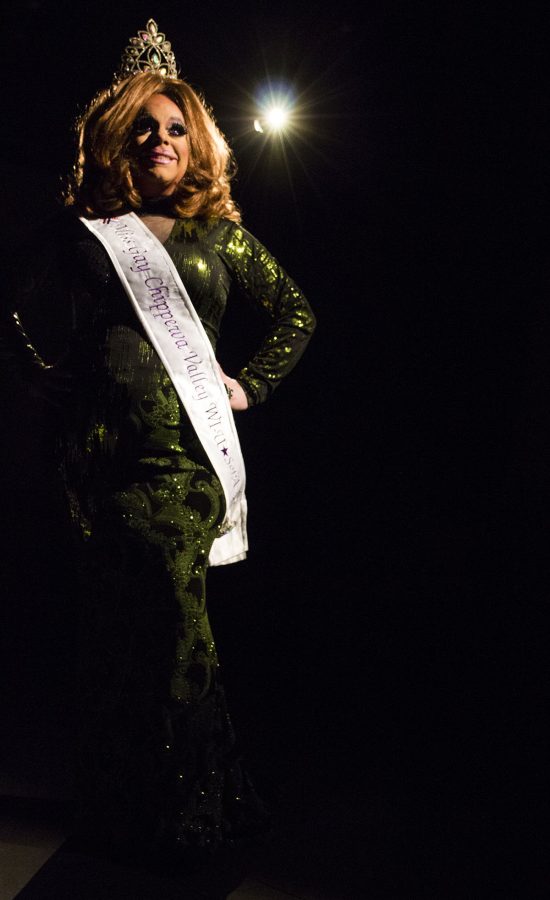UW-Eau Claire employee shares her journey with the Fire Ball
Reflecting on the past 16 years of participating in drag shows
More stories from Sydney Purpora
Photo by Kendall Ruchti
Throughout her 16 years performing as a drag queen, Ophelia Junque (Justin Brunner), has participated in roughly 250 shows across the nation. The 2017 Fire Ball will be her sixth year as a performer with the university, as one of a select few who have been a part of the show since its kickoff.
Weeks of choreographing and practicing and hours of preparation and last minute touch ups all go into the moment of the big reveal, as the curtains break, the music starts and the spotlight hits her face.
A performer who has been apart of the UW-Eau Claire Fire Ball show since day one, 39-year-old Ophelia Junque (Justin Brunner), said performing in drag shows is her way of expressing a different side of herself.
“You don’t have to be yourself,” Junque said. “You can let yourself go. You can be a different personality. You can dress however you want, and you can be whoever you want.”
As a cook at Eau Claire’s Davies Center with the company Sodexo, Junque said she enjoys being a part of a university that has a big LGBTQIA+ community.
The name Ophelia came from her love of Shakespeare and theater, and she said the last name Junque went along with Ophelia, making it “quirky.”
Starting drag when she was 24, Junque said a drag queen named Misty Lovely, who eventually became her drag mother, saw Junque at a bar one night and said she thought Junque would have a pretty face in drag.
Since her start, Junque has done shows every year, roughly about once a month adding up to a total of over 250 shows throughout the 16 years she has participated in drag. What she found most surprising over the years as a performer is that her personality and character are always changing and evolving, just like a child as they grow older.
Junque said when designing each of her acts, she makes sure to take into account the audience that will be attending as the venue size. Her acts tell a story, she said, and each performance is different from the last.
“I love that moment when the audience gets it,” Junque said.
Christopher Jorgenson, director of Women’s & LGBTQIA+ Resource Center, said those who have been with Fire Ball since its start enjoy the give and take of this show in particular.
“The local performers try to do performances that give back in some way,” Jorgenson said. “And this show has been able to do so in very important ways.”
When Junque is getting into drag makeup and dress, she said on average it will take her about two hours from beginning to end. However, for an event like Fire Ball, she said it can take her up to three hours.
Getting to perform at Fire Ball, Junque said, allows her to show people who might not have seen a drag show before her work, including some of her co-workers at the university.
“What I like about Fire Ball is it really gives us a chance to reach out into the community-at-large because it really is a good cross-section of everybody in the community,” Junque said.
One year at the Fire Ball, Junque said she performed her act as the antagonist from the Disney movie “The Little Mermaid,” Ursula. After her act, Junque said the father of a little girl in the audience, wearing an Ursula t-shirt, said Ursula is his daughter’s favorite Disney character and thanked her for the performance. In response Junque said “put her up on stage with me,” and the two walked down the runway together hand and hand waving to the audience to end her act.
The show itself offers attendees a chance to see professional drag queens perform their acts, but also, Jorgensen said, an experience of a community they don’t often get to see or learn about.
“The spectacle of drag can hold one’s attention,” Jorgenson said. “But, once the attention is held, I want to be able to sneak in educational moments and opportunities for people to understand the queer experience beyond just drag.”
After it all is said and done, Junque said when her feet are hurting, her hair is stressed from being pulled in every direction and her face is rubbed raw from removing all of the makeup, she is able to look back with pride that the show not only was a good time, but also aided a cause.
Performing in drag shows has become more than just an act for Junque; she said receiving positive feedback from the audience and seeing how it impacts their lives is what sticks with her after every show.
“I don’t care if it is an audience of one or an audience of thousands, you get that reaction from them, that’s your payback,” Junque said. “We get paid and everything but that — that’s priceless.”

